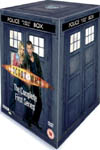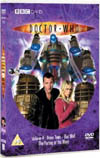DVD Extras (box sets only) include:
But the television shows we find our heroes stuck in scream "Earth"-based so loudly, that one seriously doubts that any alien planets will make it on to Doctor Who at any point this season. Pathetic. Russell T. Davies' self-proclaimed first idea for this series - game shows gone mad - is for me his least interesting by far. Sure, fans of "The Weakest Link" and "Big Brother" might well be in ecstasy while watching this modernized cross-over, but does Doctor Who really share a large enough pool of fans with those shows to make the exercise worthwhile? More to the point, the cross-over does not really fit well in Doctor Who, at least not in the way it is done in "Bad Wolf". Possibly the biggest error here is defining the year, sticking within Earth's orbit, and not inventing completely new game shows. It's hard enough to believe that television will still exist in the year 200 100, let alone still be creating new episodes of some of the more moronic shows we're watching today. It might also be easier to believe that some kind of TV lunacy could prevail on some isolated human colony in space, or some post-apocalyptic remote region on Earth - you know, in a new setting that the audience is unfamiliar with. Besides, the idea was done before, in "Vengeance on Varos" (story no. 139). Although that story's effectiveness may be more hotly debated, I felt willing to give it far more rope because an unknown culture set up the premise. The lack of scope in "Bad Wolf" can really be seen in the dialogue about not paying one's TV licence fees. It begs the question of when North Americans and most of the rest of the world would adopt England's methods of television funding, and more importantly why? Captain Jack's TV trap in "Bad Wolf" was the most painful of the three to watch. It seemed it was writer Russell T. Davies' turn to be self-indulgent, and these sequences failed to interest me in the slightest. After about 25 minutes of this story, I began to suspect it might become the worst of the season. But once our protagonists become more active, things improve. The characters busy themselves with real problems, and the mysteries escalate. Davies' does a good job of tying together the television silliness of the beginning with the mythological escalations that follow. New characters are introduced and revealed well, helping the story to be as easy to follow as its strange premise allows. Sadly, Davies does not do this without bringing up the recurring bad temporal theory that has plagued most of the season. Still unable to recognize that he is in a parallel universe whose history could unfold in any number of imaginable ways, Eccleston's Doctor thinks he knows exactly what should happen. He's got issues, so he'll always manifest himself in a universe that reflects those issues, no matter what he previously "put right". And judging by the fact that there's usually a monster waiting around the corner for him, those issues must be serious indeed. The build-up to reveal a great enemy for the Doctor to fight for the rest of the story works very well - and you could insert practically any major enemy in at that point, whether we've seen him meet them before or they're completely brand new. I'll discuss their role in the story more deeply in the in-depth analysis version of this review. And we get a wonderful cliffhanger, delivering great anticipation for an exciting, mythologically rich concluding episode. The story beat at the beginning of "The Parting of the Ways" is one of the best parts of the story, and the season as a whole. The Doctor is at his best: active, heroic, exchanging important heavy dialogue with his arch-enemies, and putting good technology to great use. And even if we don't get to an alien planet this season, we at least get a good dose of alien culture inside the enemy ship. Too bad Davies had to borrow that culture from previous Doctor Who writers, instead of making something up himself. What follows during the rest of the episode is far less than ideal. The Doctor seems to want to show us some of his old resourcefulness, wiring and cobbling together a solution to the enemy threat with the items he finds at hand. But his creation is hugely disappointing. Not good. Surely he could have thought of something better in the 2/3 of an episode that he spent building it. Captain Jack leads the charge in actual combat, during which the game show cross-over finally pays off and delivers some humorous satisfaction. However, many of the battle scenes lack good strategy and settle for ineffective cliché instead. The TARDIS is also kept quite busy during this final episode. Thankfully we get lots of satisfying materializations, and the craft is well demonstrated throughout. Lo and behold, Mickey Smith and Jackie Tyler also return to feature significantly in the episode. Any excuse to bring Mickey in is good as far as I'm concerned. Rose gets a very emotional scene that seems to contain as much of a sociological theme or point to the adventure as this story can come up with. It manages to be moving, even though the acting is ramped up more than the content seems to logically call for. Is there really nothing more to the lives of Jackie and Mickey and most of the rest of England? I think it does them a disservice to think or assume so, just as I think it's dangerous to view people's lives as utterly boring without monsters coming in to shake things up and scare people behind the sofa. There is something to be said for living the "better life" without detaching yourself from the world every 36 hours or so, and rushing off to find a new one. Jo Joyner also manages to deliver a very animated and engaging performance with the role she is given: "Lynda with a y". Apart from being generally very endearing, just count the number of odd poses she ends up twisting herself into without making it seem out of character. It seems to make a statement about how today's modern youth, which Lynda emulates so superbly, is hung up on broadcast pop-culture nearly to the point where they lose their own identity and become literally unable to stand up on their own two feet properly. Nicely done. Joe Ahearne continues to turn out exceptional work as a director, covering all the action clearly and with excitement, offering us many visual treats, and getting some fantastic and moving performances out of the actors. Not quite everything works though; in particular the flirtatious banter between the two broadcast programmers seems to go from flat to hammy. Murray Gold's music has been mostly subtle, decent, and tasteful all season, but here in this story the thematic approach he has been using really pays off as the recurring story elements weave themselves together and come to a resolution, and the music highlights and enhances this beautifully. At least twice the orchestra seemed to be unnecessarily getting into a frenzy during tense scenes, when a simpler, more ominous bass sound might have been more effective, but Gold nicely switches to that in one instance, letting the contrast indicate that things have escalated yet another level. Very nice. This brings us to the concluding story beat, and the final climactic act of the story. Eccleston's Doctor is all set to be upstaged by magic again. Without giving away as much as in the in-depth analysis version of this review, let's just say that the logic of the finale is pretty lame, although our good director makes it very emotionally and visually exciting. But Christopher Eccleston is not to be totally upstaged during his finale. Thankfully his Doctor still makes his mark on the resolution. It is hard to believe though, that this final episode was originally scripted, shot and finished with Christopher Eccleston continuing as the Doctor, because the regeneration event does so much more to completing it, and adding even more credence to the conflict resolution. Extra special kudos go to Davies, Eccleston, and the crew for reconvening to shoot this final scene and sticking it in at the last minute. It adds a lot to the story, satisfies the long term fans, and tantalizes us with a tidbit of David Tennant's tenth Doctor. Although such a small tidbit cannot all by itself tell us how great the tenth Doctor will be, viewing this bit again after seeing Tennant's Doctor in "The Christmas Invasion" sends a good chill up my spine. Tennant may be the first Doctor after Peter Davison to rank within the five best Doctors. Anticipation of season 28 could not be greater....
Season 27 Rankings:
This story has become available on DVD:
Note: The 13-episode box sets contain commentaries, behind-the-scenes featurettes, and other extras. The 3-episode volumes only feature the plain episodes. Comments on this article are welcome. You may contact the author from this page:
|








